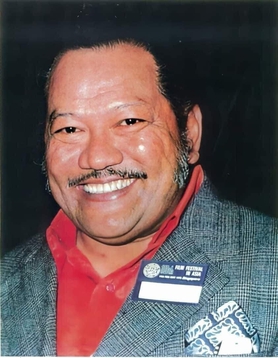
Tan Sri Datuk Amar Teuku Zakaria bin Teuku Nyak Puteh, better known by his stage name P. Ramlee, was a Malaysian actor, filmmaker, musician, and composer famous in modern-day Malaysia, Singapore, Brunei, Indonesia and Southern Thailand. Born in Penang, Malaya, he is regarded as a prominent icon in Southeast Asia.
This article lists important figures and events in Malaysian public affairs during the year 1980, together with births and deaths of notable Malaysians.
Sharifah Amani binti Syed Zainal Rashid Al-Yahya, better known by her stage name Sharifah Amani, is a Malaysian actress. She is the best known for her role as Orked in Yasmin Ahmad's 'Orked' trilogy.

Ahmad Albab is a 1968 Malaysian Malay-language black-and-white comedy-drama film directed by, written by and starring Malaysian artiste P. Ramlee about an arrogant and materialistic man who marries off his outspoken daughter to a poor villager to teach her a lesson. The story is in the style of traditional Malay folktales with an underlying moral message. The movie features real-life husband and wife P. Ramlee and Saloma acting opposite each other.

The Most Esteemed Order of the Defender of the Realm is a Malaysian federal award presented for meritorious service to the country. The Order Motto are 'Dipeliharakan Allah-Pangkuan Negara'.
Laksamana Do Re Mi is a 1972 Malay-language black-and-white adventure fantasy comedy film directed by P. Ramlee. Shot in black and white, it is the third and final installment in the Do Re Mi series of comedy films, and features the trio of actors P. Ramlee, A. R. Tompel and Ibrahim Din reprising their roles as Do, Re and Mi respectively. The story is loosely based on one of stories in One Thousand and One Nights, "The Three Princes and the Princess Nouronnihar", and features the trio becoming admirals and using magic to save a faraway kingdom from ruin. This film is notable as being the last film P. Ramlee and Ar Tompel before their death in 1973.
The Most Esteemed Order of Loyalty to the Crown of Malaysia is a Malaysian federal award presented for meritorious service to the country and awarded by the sovereign.

Salmah binti Ismail, better known by her stage name Saloma, was a Singaporean-Malaysian singer, film actress, trendsetter and a fashion icon who became well known in the late 1950s.

The Jalan Ampang Muslim Cemetery is a cemetery at the Kuala Lumpur city centre, Malaysia. It is located at Jalan Ampang near Kuala Lumpur City Centre. The cemetery was established on 1819.
Bujang Lapok is a 1957 Singaporean Malay-language black-and-white comedy film directed and performed by P. Ramlee. This is the first installment of the Bujang Lapok series of films.

Sarjan Hassan is 1958 Singaporean Malay-language black-and-white war drama film starring P. Ramlee. The film is set during the Japanese invasion of Malaya during the Second World War. Initially, the film was supposed to be directed by Lamberto Avellana; however, he was unable to fully complete the film. The directing task was later taken over by P. Ramlee.
Biduanita Negara Datuk Hajah Sharifah Aini binti Syed Jaafar, better known by her stage name Sharifah Aini, was a Malaysian singer, known as Biduanita Negara or "National Songstress" after the late Salmah Ismail (Saloma). She won first place in the Radio Television Singapore (RTS) talentime contest "Bintang RTS" competition in 1968, singing "Tiga Malam". She was famously known as Kak Pah.

Unplugged is a live album by Malaysian recording artist Siti Nurhaliza. It was released in multiple formats, both physical and digital in Malaysia on 30 June 2015. The main live tracks were all taken from her 2015 unplugged concert at Istana Budaya on 7 April 2015. The CD, digital download and LP record versions of the album however come with three new bonus songs, "Menatap dalam Mimpi", "Engkau" ("You") and "Mikraj Cinta". All were recorded specifically to accompany the three audio releases.
Do Re Mi is a 1966 Malaysian Malay-language black-and-white satirical comedy film directed by and starring P. Ramlee. The concept was partly based on the idea of The Three Stooges with Ramlee playing the character Do. Its success led to two sequels, Nasib Do Re Mi and Laksamana Do Re Mi (1972), Ramlee's last film before his death.
The Most Distinguished Order of Loyalty to the Royal Family of Malaysia is a Malaysian federal award presented for service and loyalty to the Crown, often to members of the armed forces, police and civil service.
The Selangor royal family consists of the family members of the sultan of Selangor. It currently consists of Sharafuddin of Selangor and his close relations.
Haliza Hanim Abd Halim is a Malaysian singer and actress. She is one of Adnan Abu Hassan protégés and is considered one of Malaysia's best singers who dominated the music industry in the 2000s, in line with renowned vocalists such as Siti Nurhaliza, Jaclyn Victor, Dayang Nurfaizah and Misha Omar.
The Most Valliant Order of Taming Sari is knighthood order of the Sultanate of Perak.

Takdir Itu Milik Aku is a 2024 Malaysian television series written by Wan Mahani Wan Hassan, directed by Feroz Kader, starring Emma Maembong, Shaheizy Sam, Sharifah Husna and Liza Abdullah. It premiered on Astro Ria on February 26, 2024, and airs every Monday to Thursday at 22:00 (MST).







